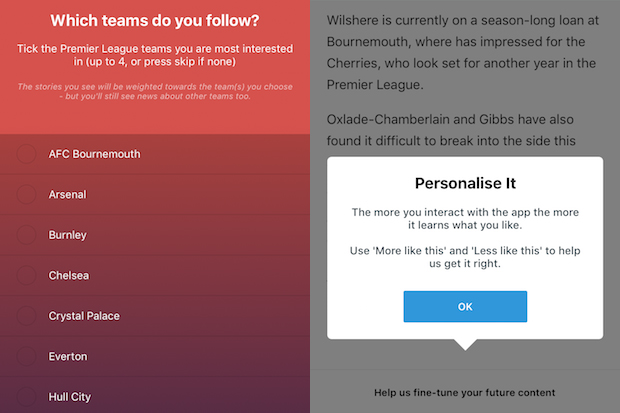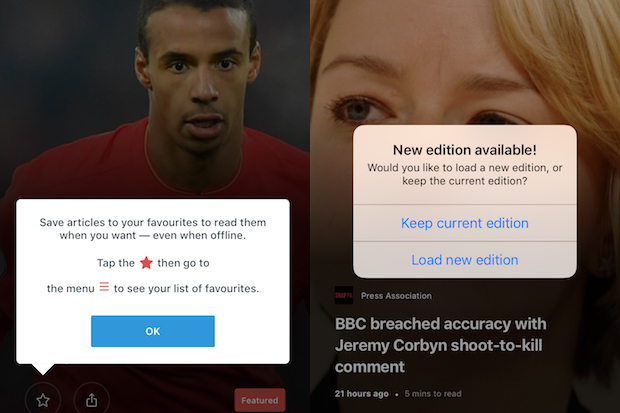In June 2016, free title Metro combined its tablet and smartphone apps into one product that could serve the digital edition of the newspaper across all devices readers might want to access it on.
The app was revamped to include the usual morning edition that comes out in line with the printed paper, but also an evening edition that was previously only available for the tablet version.
The evening edition has "more of a laidback approach", Metro digital director Martin Ashplant explained, and it reaches readers' devices around 4.30pm every weekday with the day's news, quizzes, a round up of best content from around the web, and more video and lifestyle stories.
Based on people's feedback, two main lessons learnt from changing from the main app were that readers are interested in receiving edition-based news on their devices and that they want the content to be available offline. With that in mind, Metro has developed two more apps focused on content verticals: football app 11versus11, which launched in August to coincide with the start of the Premier League season, and Guilty Pleasures, a celebrity and entertainment news app that became available in November.
Both apps are presented as editions that contain some 11 stories each, including one ad, and these are a mix of curated Metro articles and content aggregated from licensed partners, such as Press Association and Reuters, but also fan sites, blogs and regional newspapers.
They look and feel very similar, as the Metro team has designed a template that makes it easier to launch a new app for a specific vertical. While the template is not "plug and play", Ashplant said it takes the team roughly a third of the time to build a new mobile product now than if they were developing it from scratch.
"We thought from a commercial and audience viability perspective, celebrity news and football is where we would try these out first because there's a high interest level there but there is also the ability to sell ads around that content.
Personalisation is key
"We try to give people a blend so they don't just see five versions of the same story in their edition.
"What we see with both [apps], but particularly 11versus11, is that there's an audience who we think this would work for who may never have picked up or read Metro in any of the digital formats, but who this would be of interest to."
Personalisation is a key part of both 11versus11 and Guilty Pleasures, as well as achieving the overall aim of not only attracting new readers, but ensuring they regularly engage with the apps.
For example when a user downloads 11versus11, they can actively personalise their upcoming editions by choosing which football teams to follow, as well as by using the 'more like this' and 'less like this' buttons at the bottom of each article. The app will then provide stories based on their preference and their behaviour within the app.

"Every article someone reads, doesn't read, shares, or clicks on, adds to their profile so we get a sense of what's most interesting to them.
"Each time they then come back for another edition they will see a slightly different view of the content based on what the recommendation engine suggests."
The main Metro app has around 35,000 daily users, who spend an average of 28 minutes interacting with the editions, particularly with formats such as puzzles, quizzes and videos – "they see it as a part of their daily routine much in the way the Metro newspaper and other newspapers have been".
Converting downloads into engaged users
Ashplant said it's too early to release figures around 11versus11 and Guilty Pleasures, but on average, each user has had more than 100 interactions with the apps. The average time spent with the football editions is around four minutes per session, with "many people having multiple sessions within a day".
There was always an expectation that time spent would be lower than with the main app, he added, as 11versus11 was built for people to "dip in and out at any point during the day" and get a fresh mix of stories each time, as opposed to the main app which has set morning and evening editions.
"When we do any analysis as to how effective any marketing campaign has been, we look at downloads which is one thing, but also how many of them turn into engaged users?"
App users are split into four categories, with specific metrics that help determine their level of engagement: light, medium, heavy and loyal users.
For example a medium user is someone who has downloaded four editions and has consumed 100 pages of content within seven days of first opening the app. To fit into the heavy user category, someone would have to consume eight editions and 500 pages of content within seven days.
"The challenge we face, and this is probably the same for everyone with an app, is once someone has downloaded the app for the first time, how do you then convert them into a user?
"We've seen that if you can get someone to become a medium user they're more likely to turn into an ongoing one on a regular basis. If you use the app three times, the chances of becoming an ongoing user are much higher than if you only use it one or two times."

Push notifications are a significant part of Metro's strategy to get people to come back to the apps and make them aware of the benefits, such as the ability to read their favourite news offline – "trying to shout a little bit about what the advantages are helps us move people into those engaged categories".
Building a habitual relationship
One approach that was recently taken with the main Metro app was to communicate differently with people if they were not interacting with the traditional push alerts, by reminding them that they hadn't opened the app in a while and asking whether they were still interested in receiving the notifications.
On 11versus11, if a user has chosen to receive push notifications, the app sends them an alert for one story that is most relevant to them based on their football team preferences. The app also sends breaking news alerts, so if something important occurs with Arsenal for example, a user following that team would get a push alert whereas someone who doesn't follow it wouldn't.
Metro is also working on building a live scores and stats service for 11versus 11 that would give users the option to receive push notifications every time their team scores a goal or gets a card during a match.
The challenge with push alerts is "getting the blend right", Ashplant said, as some people will want to be notified of everything while for others, two or three alerts could be enough to put them off.
"It's trying to put the user in control but also letting them know the sort of things we are doing. With something like live scores, the way we are approaching it is to give people the ability to easily say yes or no at any point.
"With 11versus 11, where you've explicitly said you're interested in a certain team, there's probably a much higher tolerance for a high number of push notifications as long as they are relevant, whereas perhaps with Guilty Pleasures, you probably don't want to know everything that happens with celebrities you've shown an interest in.
"We see this entire app strategy as based around building genuinely engaged audiences who choose to come to our products and choose to use them. The aim is to build that habitual relationship with those users and make sure we deliver on what they expect from us."
Free daily newsletter
If you like our news and feature articles, you can sign up to receive our free daily (Mon-Fri) email newsletter (mobile friendly).
Related articles
- How to get started with user needs: learnings from the Reuters Institute, Metro.co.uk and smartocto
- How young leaders can shape the future of the media industry
- How do we tell stories of people neglected by the media?
- Save the date: Key dates for a journalist's calendar
- How Nature and TBIJ measure the impact of their journalism










